|
|
|
Sort Order |
|
|
|
Items / Page
|
|
|
|
|
|
|
| Srl | Item |
| 1 |
ID:
119984
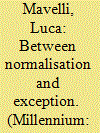

|
|
|
|
|
| Publication |
2013.
|
| Summary/Abstract |
In recent political and scholarly debates, the notion of 'securitisation of Islam' has acquired increasing relevance, yet very little attempt has been made to investigate the theoretical implications of the securitisation of Muslim subjects carried out by secular regimes for thinking security. This article aims to partially fill this gap by exploring the securitisation of Muslim minorities in Western societies as a process of construction and reproduction of secular modes of subjectivity. To this end, the article outlines the contours of an approach to securitisation which draws on both the Copenhagen and the Paris schools of security studies, as well as on a gender/body perspective which focuses on the subjectivities that securitisation aims to produce. Following some illustrations of the securitisation of Islam in the aftermath of 9/11 and 7/7, an exploration of a Western notion of subjectivity revolving around the securitisation of Christianity and the construction of Islam as a threatening deviation from this historical trajectory, and an analysis of the securitisation of the headscarf and the burqa in France, the article concludes that securitisation rests on both logics of political normalisation and exception which warrant an exploration of the discursive sediments which make them possible.
|
|
|
|
|
|
|
|
|
|
|
|
|
|
|
|
| 2 |
ID:
161423
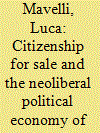

|
|
|
|
|
| Summary/Abstract |
Recent research views the proliferation of citizenship-by-investment schemes primarily as a manifestation of the commodification of citizenship by states succumbing to the logic of the market. I argue that these schemes exceed mere processes of commodification. They are part of a neoliberal political economy of belonging. This political economy prompts states to include and exclude migrants according to their endowment of human, financial, economic, and emotional capital. I show how the growing opportunities for wealthy and talented migrants to move across borders, the opening of humanitarian corridors for particularly vulnerable refugees, and the hardening of borders for “ordinary” refugees and undocumented migrants all stem from the same neoliberal rationality of government. In doing so, I challenge mainstream understandings of neoliberalism as a process of commodification characterized by the “retreat of the state” and “domination of the market.” I approach neoliberalism as a process of economization, which disseminates the model of the market to all spheres of human activity, even where money is not at stake. Neoliberal economization turns states and individuals into entrepreneurial actors that attempt to maximize their value, not just in economic and financial but also in moral and emotional terms. This process, I conclude, undermines political notions of citizenship grounded in reciprocity, equality, and solidarity, not by replacing these principles with economic ones but by rewriting these principles in economic terms.
|
|
|
|
|
|
|
|
|
|
|
|
|
|
|
|
| 3 |
ID:
157605
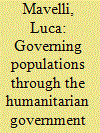

|
|
|
|
|
| Summary/Abstract |
The notion of humanitarian government has been increasingly employed to describe the simultaneous and conflicting deployment of humanitarianism and security in the government of ‘precarious lives’ such as refugees. This article argues that humanitarian government should also be understood as the biopolitical government of host populations through the humanitarian government of refugees. In particular, it explores how the biopolitical governmentality of the UK decision to suspend search-and-rescue operations in the Mediterranean in 2014, and the British rejection and German welcoming of Syrian refugees primarily concern the biological and emotional care of the British and German populations. To this end, the article analyses how dynamics of inclusion/exclusion of refugees have been informed by a biopolitical racism that redraws the boundary between ‘valuable’ (to be included) and ‘not valuable’ (to be excluded) lives according to the refugees’ capacity to enhance the biological and emotional well-being of host populations. This discussion aims to contribute to three interrelated fields of research – namely, humanitarian government, biopolitical governmentality, and responses to the European refugee crisis – by exploring how biopolitics has shaped the British and German responses to the crisis and how it encompasses more meanings and rationalities than currently recognised by existing scholarship on humanitarian government.
|
|
|
|
|
|
|
|
|
|
|
|
|
|
|
|
| 4 |
ID:
144781
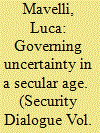

|
|
|
|
|
| Summary/Abstract |
This article explores the problem of governing uncertainty in a secular age by focusing on the theological notion of ‘theodicy’ as the underlying rationale for the use of torture in the so-called ‘war on terror’. With God’s departure from the world, the problem of uncertainty acquires new salience as human beings can no longer explain tragic events as part of a transcendent order and must find immanent causes for the ‘evils’ that surround them. Taking a cue from Max Weber, I discuss how the problem of theodicy – how to reconcile the existence of God with the presence of evil in the world – does not disappear in the secular age but is mobilized through a Foucauldian biopolitical logic. Secular theodicy governs uncertainty through the production of economies of knowledge that rationalize processes of criminalization and securitization of entire groups and justify the use of violence. This process is particularly striking when analysing the use of torture in the so-called ‘war on terror’. Through a comparison with medieval practices and focusing on the cases of Guantanamo and Abu Ghraib, the article shows how secular torture is the product of a biopolitical theodicy aimed at governing uncertainty through the construction of the tortured as immanent evils who threaten our ‘good life’ and ‘deserve’ their treatment. Secular theodicy turns torture into an extreme form of governmentality of uncertainty in which the disciplining of conduct becomes the construction of subjectivities based on essentialist, stereotypical and racist – and for these very reasons, reassuring – economies of knowledge.
|
|
|
|
|
|
|
|
|
|
|
|
|
|
|
|
| 5 |
ID:
117455
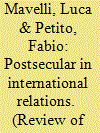

|
|
|
| 6 |
ID:
117462
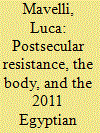

|
|
|
|
|
| Publication |
2012.
|
| Summary/Abstract |
At the heart of the notion of the postsecular is an implied and largely under-theorised idea of resistance against the pathologies of modern secular formations. This is most notably exemplified by Jürgen Habermas's highly influential approach which argues that these pathologies can be resisted through a cooperative cognitive effort of secular and religious consciousnesses. This article contends that this understanding overlooks more embodied forms of resistance to the effect that it curtails our capacity to conceptualise postsecular resistance in international relations. Following a contextualisation of Habermas's approach in the broader Kantian tradition to which it belongs, the article develops a contending Foucauldian reading of the body as a locus of resistance and uses this framework to analyse some of the events leading to the 2011 Egyptian revolution. The focus is on the publication of images and videos of police abuses by Egyptian bloggers and independent media as a practice of resistance to the widespread and systematic use of torture. The emotional response to these images, it will be argued, contributed to unite Egyptians despite longstanding fractures, most notably that between secularists and Islamists, thus turning the body from an 'inscribed surface of events' into a postsecular locus of resistance. The article concludes by highlighting the main implications of this analysis for future research agendas on the postsecular in international relations.
|
|
|
|
|
|
|
|
|
|
|
|
|
|
|
|
| 7 |
ID:
110832
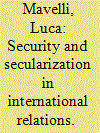

|
|
|
|
|
| Publication |
2012.
|
| Summary/Abstract |
What is the relationship between security and secularization in International Relations? The widespread acceptance of secularism as the paradigmatic framework that underlies the study of world politics has left this question largely unexplored. Yet, the recent challenges to the secularization thesis and the growing attention that is being devoted to questions of religion and secularism in international politics increasingly suggest the importance of undertaking this investigation. This article takes up this task in three main steps. First, it will explore how the limits of a widely accepted but nonetheless problematic account of the emergence of the modern Westphalian nation-state contribute to a dominant underlying assumption in security studies that implicitly associates security with secularization. Second, it will articulate a competing genealogy of security and secularization which suggests that rather than solving the problem of religious insecurity, secularization makes the question of fear and the politics of exceptionalism central to the state-centric project of modernity and its related vision of security. Finally, the article will examine how these elements inform and, most of all, constrain attempts to move beyond the traditional state-centric framework of security. The focus will be on three such attempts: human security, the securitization theory and Ken Booth's critical theory of security.
|
|
|
|
|
|
|
|
|
|
|
|
|
|
|
|
|
|
|
|
|